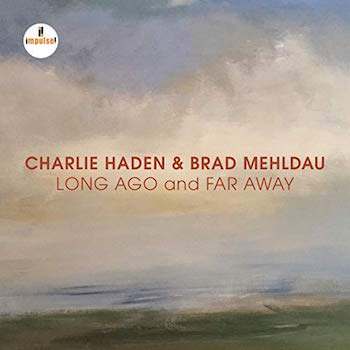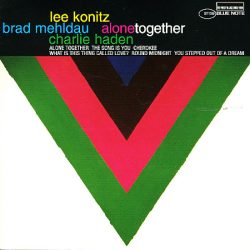Jazz CD Review: “Long Ago and Far Away” — Together Again
By Michael Ullman
This set is surely one of the finds of the year.
Charlie Haden & Brad Mehldau: Long Ago and Far Away. (Impulse Records)

Recorded on November 5, 2007, Long Ago and Far Away is a live duet album that sounds, at least to this listener, like a final shoe dropping. It’s the fourth disc featuring bassist Charlie Haden and pianist Brad Mehldau, chronologically their third session together. Mehldau seems to have been Haden’s discovery. In her notes to the album, the bassist’s widow, Ruth Cameron Haden, writes in breathless detail about how the two musicians first met. Haden and wife were at a jazz festival in the Laurel Mountains on September 19, 1993. (She even remembers the date!) They were walking by a concert hall; through a closed door, Haden heard a pianist soloing. Transfixed, he stopped, entered, and found Mehldau at the keyboard. “He is special, so unique,” Haden proclaimed; he became Mehldau’s biggest fan.
In 1997, Haden was asked by King Records to make a duet record with the great, through slightly ornery, alto saxophonist Lee Konitz. Haden suggested adding pianist Mehldau, at the time a relative unknown. Konitz was nervous — how were they going to make a duo album? Somehow they did, though most of the performances featured a trio. There were no rehearsals, just two nights of a live date — the tape machine running. Amusingly, Konitz was not initially pleased with the set-up. In his notes to Alone Together, the saxophonist recalled the experience: “Actually, after the first set I was kind of upset, and I said to myself, ‘Oh oh, here I am with another virtuoso…But the next set and the next day Brad was all ears, and I found myself appreciating his virtuosity — it was inspiring.” Two superb discs came out of those December, 1997 sessions: Alone Together and Another Shade of Blue. Twelve years later, in December, 2009, the trio grew into a quartet with the addition of drummer Paul Motian. The result was Live at Birdland.
Long Ago and Far Away is the result of a special occasion that was sandwiched between those previously issued sessions. We owe the recording to Rainer Kern, the director of the Enjoy Festival in Germany, who invited the duo to perform, and to Ruth Cameron Haden. Kern wanted to record the duo but the musicians said no. Ruth Haden wouldn’t accept that answer as final. Somehow she convinced her husband to let the concert be recorded; Kern allowed the musicians to own the rights. Because of unspecified contractual issues, the music couldn’t be issued until now. But during his lifetime Charlie Haden “listened to the tape often and dearly wanted to release it.” His wish has been granted posthumously.

Mehldau and Haden are, in some ways, an odd couple but all four dates work beautifully. As Konitz noted, Mehldau is a bit of a virtuoso — even a showoff. He can go all over the keyboard with ease, playing inside or outside a given structure. In the opening number of Long Ago and Far Away, a slowed down version of Charlie Parker’s “Au Privave,” the pianist has a little conversation with himself, playing variations of his own invented phrases — they seem to pop up from all over the instrument — while Haden plays a single note every two beats. The bassist is so focused that he can — and sometimes does — make a single note resonate like a singularly rich event, a scale sounds like a symphony. Konitz observed that performing with Haden is like bouncing on a trampoline: the bassist plays a note and leaves space for the soloist to do whatever he wants. Somehow Haden’s notes and sequences suggest a rhythm as well as pitches and scales.
Recorded in a space with beautiful acoustics, Long Ago and Far Away, Haden is given the opportunity to present lengthy solos as well as serve as an accompanist. He seemingly takes us far away from Charlie Parker on “Au Privave,’ though the miracle of his performance is that he plays a seemingly endless series of related melodies and phrases, sometimes providing elaborate variations, that create their own logic. No matter what its length, one can always follow a Haden solo.
The two make a kind of blues out of the classic ballad “My Old Flame,” reminding us that Haden often played with quartets that specialized in standards. It’s a joy to hear Haden improvise, bits of the melody recurring here and there. They follow the ballad with a surprising choice, Irving Berlin’s 1923 song “What’ll I Do.” In the ’30s, Paul Whiteman recorded this number; its peculiarity is that the tune’s bridge is virtually the main phrase, transposed. Whitman made the see-saw-ish effect sound like muzak, merely playing and replaying the melody via different instrumentation. The duo do more more than salvage Berlin’s song. Mehldau plays a short introduction, with a gentle bounce, and the pair play the waltz with an elegant delicacy. Mehldau then creates new melodies over the skipping bass of Haden.
There are other riches on this disc, including a cheerily upbeat version of “Long Ago and Far Away,” once famously recorded as a vocal by Chet Baker. The final tune is an equally memorable version of “Everything Happens to Me.” It’s hard not to sing along. This set is surely one of the finds of the year.
Michael Ullman studied classical clarinet and was educated at Harvard, the University of Chicago, and the U. of Michigan, from which he received a PhD in English. The author or co-author of two books on jazz, he has written on jazz and classical music for The Atlantic Monthly, The New Republic, High Fidelity, Stereophile, The Boston Phoenix, The Boston Globe, and other venues. His articles on Dickens, Joyce, Kipling, and others have appeared in academic journals. For over 20 years, he has written a bi-monthly jazz column for Fanfare Magazine, for which he also reviews classical music. At Tufts University, he teaches mostly modernist writers in the English Department and jazz and blues history in the Music Department. (He plays piano badly.)
